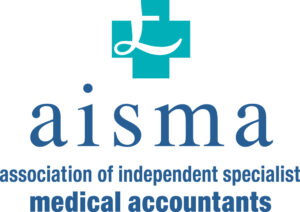Several contributors to our summer AISMA Doctor Newsline referred to the need for practices to look at how they operate.
Author: Sue Beaton,** AISMA board member
The focus largely concentrated on ways to maximise quality delivery of medical services, to tighten up and better control claims and to streamline clinical work processes for greater efficiency. But a related aspect of examining processes and how practices work is the accounting and finance function, including when and how their income and outgoings are recorded and what is done with that information. There are some excellent and high achieving practices who still have not fully geared up their financial record-keeping to get the most from their financial reporting.
Several would not currently be fully ready or compliant for the start of Making Tax Digital (MTD), which, for medical partnerships with individuals as partners, commences in 2025-26. This will require quarterly reporting of financial information to HM Revenue and Customs (HMRC) using accredited software packages approved for this purpose.
A surprising number of practices still use outdated, limiting accounting software. And some even still maintain records via Excel spreadsheets which are updated infrequently, mainly when the information is requested by accountants to compile the year end accounts. These practices could gain so much more timely insight into how they are doing financially if they invested in cloud-based accounts software as soon as possible, even before MTD makes it necessary. Authorised users can access the records from anywhere.
A bank feed gives access to live information, enabling approved users to regularly monitor transactions. Ledgers can be set up with a little more training.
A sales ledger enables you to keep a continual record of claims and outstanding invoices such as solicitor or medico legal reports, which clear down once the money is received. Aged debtors’ reports give a clear statement of who owes what to the practice at any one time and how long these amounts have been outstanding.
Similarly, a purchase ledger enables the logging of outstanding amounts payable to suppliers which, again, clear down as they get paid. At the touch of a button, assuming the data has been entered correctly, the practice can see how much it owes to suppliers at any given time.
Profit and loss statements and balance sheets for specified periods can be run and, provided the entries recorded in the system are accurate, can prove valuable tools in helping the practice see its performance and compare with previous quarters, 12 months or even several preceding years.
Figures in the system can be drilled into to see underlying details, supporting invoices and notes. Files or working papers can be uploaded into the records too. Likewise, information can be downloaded in various formats, including Excel. Even practices who already use cloud-based, MTD-approved software could benefit from these aspects. These tools can provide a deeper understanding of the day-to-day finances, cash flow can be more closely monitored, and budgeting and monitoring refined.
In these challenging times, with spiralling inflation and rising interest rates, having appropriate and up-to-date financial systems and software that is fit for purpose is very important for a practice’s efficient running. Having access to timely and accurate financial information is a crucial part of operating a more commercially savvy business. There are likely to be many practices whose current financial internal record-keeping leaves something to be desired. They can be as smart as they like with the patients and the clinical work. But if their underlying accounting data is not properly recorded or reconciled, is slow to be updated, and is using outdated products, they will never be as good as they could be.
Making changes is never easy but compliance with MTD is not far away so looking at systems, biting the bullet and having access to better financial data now will bring the chance of being more financially aware and better equipped to run a tighter practice.
** Sue Beaton is director of medical services at Coveney Nicholls
This article first appeared in the Autumn 2022 issue of AISMA Doctor Newsline.
We have considerable experience an in all major software suppliers, such as Xero, Sage, Quickbooks etc, so are well placed to offer free demonstrations to help make the right choice and get set up. If you would like to explore moving to cloud based software and understand how it could benefit your practice please contact us.
Our specialist medical division is led by Simon Dudfield. Simon and his team have a wealth of experience in advising medical practices, GPs and consultants. You can take advantage of our expertise including a full range of accounting, taxation and business advisory services designed specifically for medical practices and practitioners. We are members of the Association of Independent Specialist Medical Accountants, AISMA.




